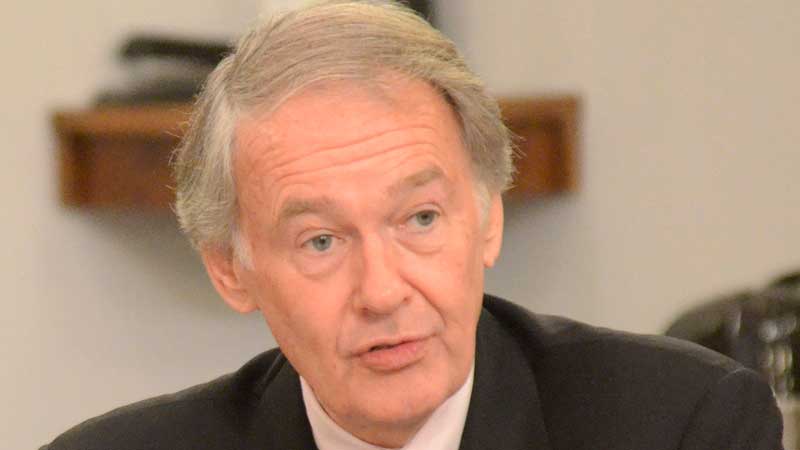Markey Marks ISP Dereg Anniversary with Symbolic Gesture

The smarter way to stay on top of broadcasting and cable industry. Sign up below
You are now subscribed
Your newsletter sign-up was successful
To no one's surprise, a trio of Democratic senators failed in their effort, which was always symbolic, to get the Senate to take up the Save the Internet Act, the House-passed bill that would restore FCC regulation of internet access.
The Senators, led by Ed Markey (D-Mass.), took up some floor time making their points about why it was crucial to restore the rules against blocking, throttling and paid prioritization, and how since the "Trump" FCC deregulation, unlimited data plans weren't, ISPs were "mega" merging to reduce choice and competition, and the internet was "fracturing" into anti-competitive haves and start-up have-nots.
Related: OMB Advises President to Veto Save the Internet Act
But the effort was primarily to mark the one-year anniversary of the effective date of the deregulatory Restoring Internet Freedom (RIF) order, which the Democrat's bill would undo, and reiterate their passion for Title II-based net neutrality rules, rather than any hope of success.
Markey called for unanimous consent (UC) to bring up the bill--which Senate Majority Leader Mitch McConnell (R-Ky.) has said he will not do. But to succeed in the UC vote, which is a way to fast-track legislation outside regular order, no senator, Republican or Democrat, could object, and plenty of Republicans object to the bill.
Sen. Roger Wicker (R-Miss.), chairman of the Senate Commerce Committee, stood to do the objecting. He said he did not expect that was a surprise to the other side. He said that rather than being a threat to openness and a way for cable operators to "gouge" their subs and repress innovation and nip start-ups in the bud, as the Democrats had asserted, the Republican FCC's RIF order had not led to blocking or throttling or indiscriminate price hikes, but to record fiber broadband buildouts, higher speeds and a rebound in investment.
As to protecting a free and open internet and rules to that effect, Wicker said the Senate could pass a bill "tomorrow" that would restore the FCC's power to prohibit blocking and throttling and paid prioritization, just not using Title II authority to regulate rates, which Markey and his compatriots said is necessary. Republicans and ISPs are generally supportive of providing some regulatory certainty with a law that restores the FCC rules against blocking and throttling and anticompetitive paid prioritization, but not to bringing back the general conduct standard, which they also see as a way for the FCC to regulate ISP pricing, and not under Title II common carrier regs.
The smarter way to stay on top of broadcasting and cable industry. Sign up below
Certainly the Democratic trio seemed focused on price. Sen. Maria Cantwell (D-Wash.), ranking member of the Commerce Committee--Sen. Ron Wyden (R-Ore.), who introduced net neutrality legislation with Markey 15 years ago--was the third to stand and deliver for net neutrality activists everywhere--talked repeatedly about how Big Cable had gouged its customers over the past year, hammering home the rising price points she suggested the FCC deregulation had spurred.
Markey also said, perhaps for those who had not seen those hikes, that some of the increases might be hidden. He said with cable ISPs were discounting one bundle, while increasing prices and data limits on "everything" else.
While he may have lost the vote, Markey insisted he and his colleagues were on the right side of history and would continue to fight in Congress and the courts.
The floor speeches were streamed as part of a day-long online protest by net neutrality activists to mark the one-year deregulatory anniversary.
“Two months ago, a bipartisan majority in the House stood up for consumers and small business that want equal access to the Internet," said Computer & Communications Industry Association president Ed Black. "The Senate passed essentially the same bill in the last Congress, so we applaud Sens. Markey, Cantwell, and Wyden -- longtime advocates for consumers and net neutrality -- for their leadership in calling for Senate action on this bill. We need critical net neutrality protections, and we call on the Senate to pass the Save the Internet Act.”
Contributing editor John Eggerton has been an editor and/or writer on media regulation, legislation and policy for over four decades, including covering the FCC, FTC, Congress, the major media trade associations, and the federal courts. In addition to Multichannel News and Broadcasting + Cable, his work has appeared in Radio World, TV Technology, TV Fax, This Week in Consumer Electronics, Variety and the Encyclopedia Britannica.

